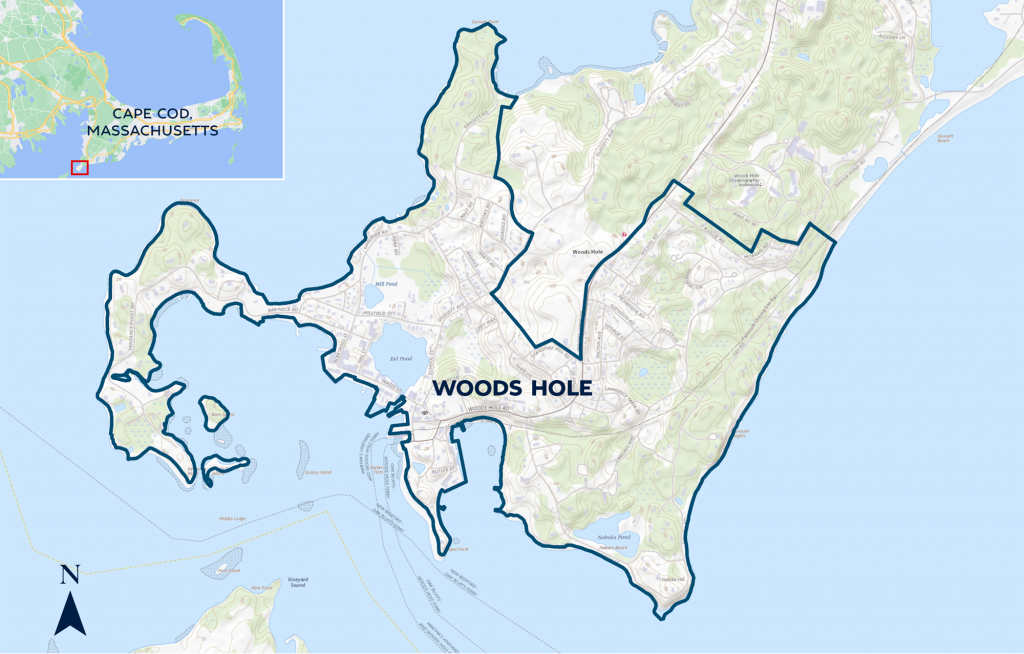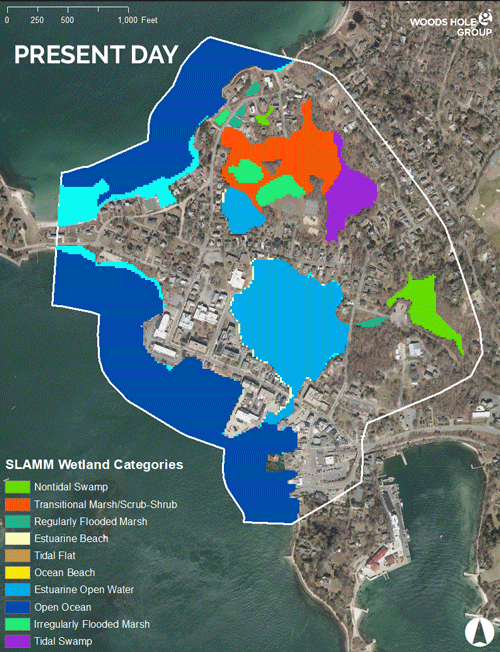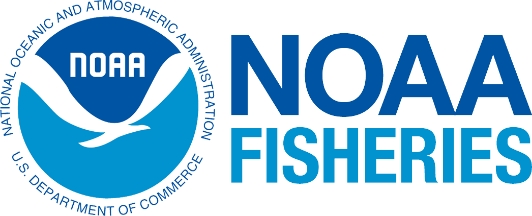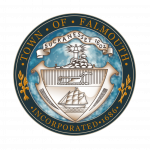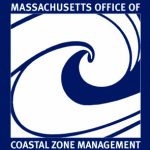FACT: ECONOMIC IMPACT
$385M
Collectively, WHOI, MBL and NOAA Fisheries employ over 1,710 individuals, have a combined annual budget of over $385M, and conduct $256M in research annually.
Why adapt to climate change?
Connected to the Sea
With roots in whaling, shipping, and fishing, Woods Hole has been a bustling working waterfront and marine commerce hub for more than two centuries. Today, Woods Hole is a world-renown center for scientific research and education, and a charming residential and commercial village that attracts both summer residents and tourists. Along with its coastline businesses and homes, the major marine research institutions in Woods Hole have significant waterfront infrastructures, providing necessary easy access to the sea.
Challenges
Relative sea level increased by approximately 10 inches in Woods Hole between 1932 and 2020, according to NOAA. This trend is predicted to accelerate as the ocean expands due to global warming and glacial ice melt.
Woods Hole’s vulnerability to sea-level rise, storm surge inundation, and habitat changes, such as marshland transforming to open water, was assessed in detail in 2020 by the Woods Hole Group. A copy of the report is here.
Climate impacts were projected over 10, 40, and 60-year time horizons. By 2070, the report predicts, most of the village will be inundated by flooding on an annual basis. The report made it clear that resiliency planning to protect village infrastructure and habitat needed to begin immediately. Thus, the ResilientWoodsHole initiative was born.
Sea-level rise and storm surge present both existential and operational threats to Woods Hole village’s marine science facilities as well as to the commercial and residential infrastructure within the village. Often it is not viable or sustainable to adapt assets to sea-level rise and/or storm surge in a vacuum. It can also be more efficient and have greater benefit to deploy adaptation solutions on a wider scale to address shared risk rather than addressing each specific flood vulnerability on a case-by-case basis.
What are we doing about it?
Woods Hole is home to world-renowned scientific organizations, a vibrant business and residential community, and serves as a vital ferry link to the island of Martha’s Vineyard. With a mission-focused need to be proximate to the sea, the Woods Hole Oceanographic Institution (WHOI), the Marine Biological Laboratory (MBL), and NOAA’s Northeast Fisheries Science Center (NOAA) initiated the development of a long-range framework to prepare for sea-level rise and increasing extreme weather events. A cooperative effort is underway to assess these threats and jointly develop solutions that frame responses for the broader Woods Hole community.
Who we are
Steering Committee
ResilientWoodsHole is advised by a broad group of stakeholder representatives as empaneled on the Steering Committee.
| Committee Member | Organization |
|---|---|
| Rob Munier | WHOI |
| Leslie-Ann McGee | WHOI |
| Mike Barrett | WHOI |
| Paul Speer | MBL |
| Nicole Cabana | NOAA NMFS NEFSC |
| Nathan Keith | NOAA NMFS NEFSC |
| Alyson Pitts | NOAA NMFS NEFSC |
| CDR John Singletary | USCG |
| Bob Davis | Steamship Authority |
| Rob Thieler | USGS |
| Patrick Masterson | Woods Hole Business Association |
| Zach Zobel | Woodwell Climate Research Center |
| Mike Renshaw | Town of Falmouth – Town Manager |
| Jen Lincoln | Town of Falmouth – Conservation Commission |
| Jed Cornock | Town of Falmouth - Town Planner |
| Amy Lowell | Town of Falmouth – Wastewater Dept |
| Pam Harvey | Community Liaison |
| Peter Jeffrey | Community Liaison |
| Judy Laster | Community Liaison |
| Catherine Bumpus | Woods Hole Community Association |
| Steve McKenna | MA Office of Coastal Zone Management |
| Shannon Hulst | Barnstable County Floodplain Manager/WHOI Sea Grant |
Leadership
Woods Hole Oceanographic Institution (WHOI)
Marine Biological Laboratory (MBL)
NOAA Northeast Fisheries Science Center (NOAA Fisheries)
Partners
While the initiative draws upon and engages a wide variety of stakeholders, ResilientWoodsHole is led by a collaboration between WHOI, MBL, and NOAA Fisheries. The Town of Falmouth, the Massachusetts Office of Coastal Zone Management, and the Woods Hole Group are active partners in this initiative.
FACT: INFRASTRUCTURE
$110.7M Revenue
2019 transportation to the islands from Woods Hole:
22,949 trips
3,004,436 passengers
478,990 autos
195,328 trucks

